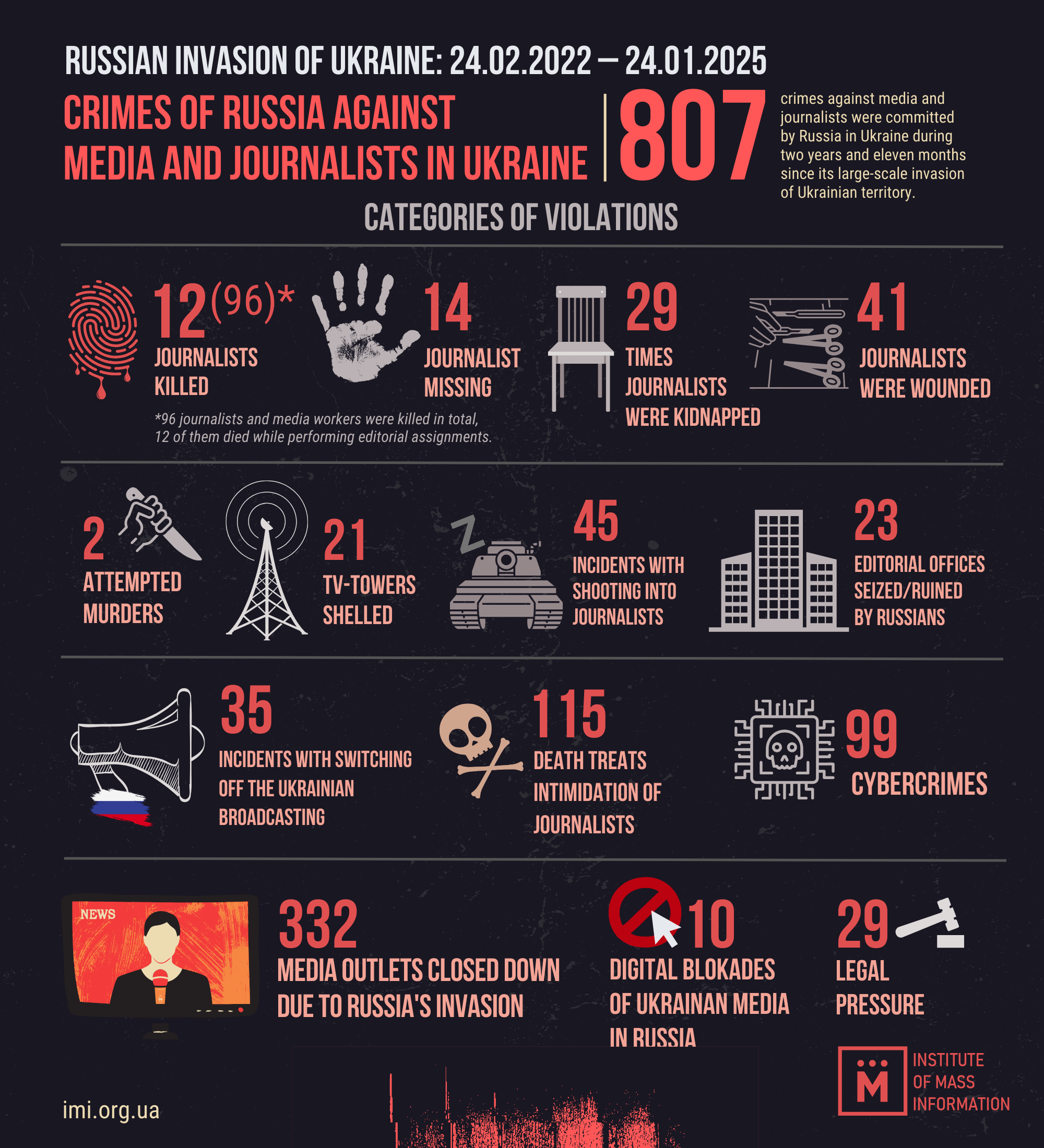In the 2 years and 11 months since the start of the full-scale invasion Russia committed 807 crimes against journalists and the media in Ukraine.
This is evidenced by the monthly monitoring study of Russia’s crimes against journalists and the media, which the Institute of Mass Information has been carrying out since the first day of Russia’s full-scale invasion of Ukraine, February 24, 2022.
In December 2024 – January 2025, the IMI recorded 7 crimes against the media and journalists committed by Russia. These included intimidation of journalists, cyber attacks, and media outlets closing down as a result of the Russian invasion.
Two media professionals turned soldiers were killed in action during this period:
- Anton Vovk, music editor for Starlight Media’s MasterChef turned soldier. He was killed in action while performing a combat mission on December 28, 2024. He served in the separate airborne assault brigade No. 95.
- Ruslan Hanushchak, a military photographer and cameraman from Ivano-Frankivsk who served in the UAF Mechanized Brigade No. 92. His death was reported in January 2025.

Russia’s crimes against the media and journalists in the 2 years and 11 months of the full-scale war
Journalist Vitaliy Portnikov reported that his assassination was in the works, triggered by an excerpt from his interview with Natalia Baliuk last year. He said that Russian and pro-Russian agents were using this excerpt to harass him, trying to frame it as him defending an “imaginary ‘nobility’ that should not be fighting in the army.” According to him, the excerpts from this interview are being used to manipulate people, fostering an environment of hatred around him; Portnikov says he has received death threats.
Two newspapers (Kropyvnytskyi’s Nova Hazeta and Chernihiv’s Slovo Varvynshchyny) were indirectly affected by the influence of Russia’s war on Ukraine’s media market. Nova Hazeta is permanently going out of print in 2025. Editor Inna Danilchenko says they were unable to produce a quality product with the funding the newspaper could afford. The Chernihiv oblast newspaper Slovo Varvynshchyny is temporarily going out of print due to having no funding for the next six months.
Journalists continued to receive anonymous emails with bomb threats targeting their offices. ZHAR.INFO journalist Alyona Bereza received anonymous emails claiming that a bomb had been planted in the building where the media outlet’s office is located. Rayon.in.ua journalist, West Media Forum coordinator Olha Bulkovska also received an email threatening an upcoming series of explosions.
The FREEDOM TV website sustained a mass DDoS attack. The TV channel suspects Russian hackers to be behind the incident. The attack occurred in two waves. The website received over 5 million requests in a short time, coming from almost 80 countries, and continued to work with minor complications.
Read the full monitoring here.
The Institute of Mass Information (IMI) is a Ukrainian non-governmental media organization that has been operating since 1996. The IMI defends the rights of journalists, analyzes the media field and covers media-related events, fights propaganda and disinformation and has been providing media outlets with safety gear for trips to the combat zone since the start of the Russo–Ukrainian war in 2014.
The IMI carries out Ukraine’s only freedom of speech monitoring and keeps a list of high quality and sustainable online media outlets, documents Russia’s crimes against the media committed in the course of the war on Ukraine. The IMI has representatives in 20 oblasts of Ukraine and a network of “Mediabaza” hubs to provide journalists with continuous support. The IMI’s partners include Reporters Without Borders and Freedom House; the organization is a member of the International Organization for the Protection of Freedom of Expression (IFEX).
